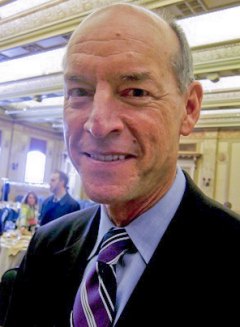
is leading the new effort.
(2012 photo by Portland Afoot)
A new nonprofit advocacy group is setting out to be public transportation’s answer to the Bicycle Transportation Alliance.
Using Seattle’s Transportation Choices Coalition as their working model, a small group of Portland-based advocates has been working since December under the leadership of David Knowles, the top Portland executive at government contractor CH2M Hill, to discuss the nonprofit startup.
The group is in the process of recruiting its founding staffer.
“I think this region has generally been committed to transit, but a focused effort to expand transit is really needed at this time,” Mara Gross, interim executive director of the Coalition for a Livable Future and a participant in the conversation, said Monday. “Lower-income communities and communities of color are increasingly living in a ring around the central cities. They’re in East Portland, east county, Washington County, Clark County … regions that are harder to serve by transit.”
Rob Sadowsky and Steph Routh, executive directors of the BTA and Oregon Walks, have also been invited to the talks, as have TriMet, Bernie Bottomly of the Portland Business Alliance, the anti-sprawl nonprofit 1000 Friends of Oregon, and representatives of many local businesses including chipmaker Intel, planning firm David Evans and Associates, architects Zimmer Gunsul Frasca and downtown real estate firm Melvin Mark.
Though those groups haven’t necessarily signed on to help the effort, organizers believe all of them, among others, share an interest in good public transportation and could be willing to support advocacy on its behalf.
OPAL’s Bus Riders Unite, the region’s most prominent transit advocacy group since 2010, hasn’t been part of the talks yet. Neither has Amalgamated Transit Union Local 757, the transit workers’ union.
Transportation Choices Coalition, the Seattle group that serves as the model, has six in-house staff and a 2013 annual budget of $625,000. It’s sponsored by regional and national foundations, transit agencies, railbuilding contractors and unions, developers, major employers and between 400 and 450 individual donors, according to TCC membership manager Carla Saulter.
“I think there is a need for an outside-government voice broadly speaking about the value of transit.”
— Mara Gross, Coalition for a Livable Future
Chris Rall, a Portland-based advocate for better federal transit funding who’s been involved, said he sees a “hole” in local and regional advocacy, with the BTA and Oregon Walks missing a counterpart and ally when public transit issues come up for debate.
The new Oregon effort is conceived to build consensus around both transit service and transit infrastructure, Knowles said Monday. Both seem to be in danger.
Ten days ago, an expansion of TriMet’s Yellow Line died with the Columbia River Crossing. Last year, a top Metro planner said explicitly that “most corridor plans are not going to end” with light rail “for a long time.” New Portland Transportation Commissioner Steve Novick ran for office saying he didn’t expect further Streetcar expansion in the near future. TriMet, meanwhile, is about to be audited by a skeptical state government and dealing with a three-way tradeoff among tax levels, service frequency and worker pay.
If anyone in the Portland area could gather enough momentum for a well-funded new pro-transit group, Knowles would seem to have the resume for it.
A board member of the Portland Business Alliance and former chair of its transportation committee, Knowles has run Portland’s Bureau of Planning, served as a Metro councilor and been an executive at the major engineering and planning contractors David Evans and Associates and CH2M Hill.
“This group has folks around the table with resources, and they could bring more capacity and voices of unlikely allies to this conversation,” said Gross. She said that although some of those voices have disagreed with her on past issues, she’s optimistic about the possibility to unite around common ground.
For those of us in the Portland area who believe in bikes, this is an important development. Governments often don’t seem to think holistically about how bikes and transit can cooperate to make a great city work: all Portlanders would benefit from having affordable housing in central neighborhoods and making sure all projects are served well by something other than cars. If Portland’s rich and growing expertise in bike planning can be part of this new transit advocacy, everyone will benefit.
To pick just one instance, as Portland transportation advocates talk more about a possible per-household “street fee” that could fund some combination of bike, pedestrian, transit and paving upgrades, the new group might be a useful political ally.
“There’s a potential at all different levels of government for some sort of policy and funding changes,” Rall said. “The street fee would be an example of something where there would be an opportunity for collaboration.”

